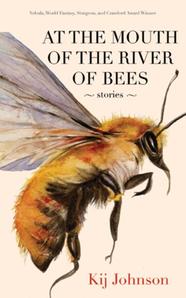
 Kij Johnson won the 2009 Nebula award for best science fiction short story with "Spar," an unrelenting tale about an astronaut trapped in an escape pod with an alien life form that blindly assaults her over and over. "She feels it everywhere inside," Johnson writes, "tendrils moving in her nostrils, thrusting against her eardrums, coiled besides the corners of her eyes." The following year, she won the prize again for "Ponies," a short short that begins with the surface sweetness of little girls playing with cartoon-like horses before taking a sharp turn with a chilling allegory of adolescent popularity dynamics.
Kij Johnson won the 2009 Nebula award for best science fiction short story with "Spar," an unrelenting tale about an astronaut trapped in an escape pod with an alien life form that blindly assaults her over and over. "She feels it everywhere inside," Johnson writes, "tendrils moving in her nostrils, thrusting against her eardrums, coiled besides the corners of her eyes." The following year, she won the prize again for "Ponies," a short short that begins with the surface sweetness of little girls playing with cartoon-like horses before taking a sharp turn with a chilling allegory of adolescent popularity dynamics.
And then, the year after that, she received another Nebula for her novella "The Man Who Bridged the Mist." This story takes full advantage of its greater length, slowly exploring the psyche of Kit, an architect sent to an outpost at the remote end of an empire to build a bridge that will span a turbulent river of mist. Kit falls in love with Rasali, the woman who runs the main ferry connecting the towns of Nearside and Farside, even as he realizes that his bridge will make her job obsolete. The depth of Johnson's portrayal of their relationship is matched by her attention to the details of life in her fantasy kingdom, a setting somewhat further along than the medieval but not quite modern, with mysterious beasts lurking under the mist ready to devour unprepared travelers.
Like these three, the other stories collected in At the Mouth of the River of Bees exhibit a captivating blend of psychological realism and hallucinatory vision, with animals often playing a central role. In the title story, a young woman and her aging dog are driving across Montana when the highway is closed due to the overflowing of the Bee River--which turns out to be quite literally named. "The Evolution of Trickster Stories Among the Dogs of North Park After the Change" takes place in a world where pets have gained the ability of speech and are abandoned by their freaked-out owners. ("Sometimes we think we want to know what our dogs think," Johnson writes. "We don't, not really.") Two stories set in ancient Japan, "Fox Magic" and "The Cat Who Walked a Thousand Miles," are embryonic versions of Johnson's novels The Fox Woman and Fudoki.
Johnson shifts easily from domestic dramas ("The Bitey Cat") to conflicts on a vast alien landscape ("The Horse Raiders"), hitting many points in between. When she's at her best, the small emotional moments are as likely to linger in your memory as the fantastic imagery. --Ron Hogan, founder of Beatrice.com
Shelf Talker: Johnson would fit quite comfortably on a shelf with Karen Russell, Erin Morgenstern and others who hover in the simultaneous state of being both "literary" and "fantasy" writers.

